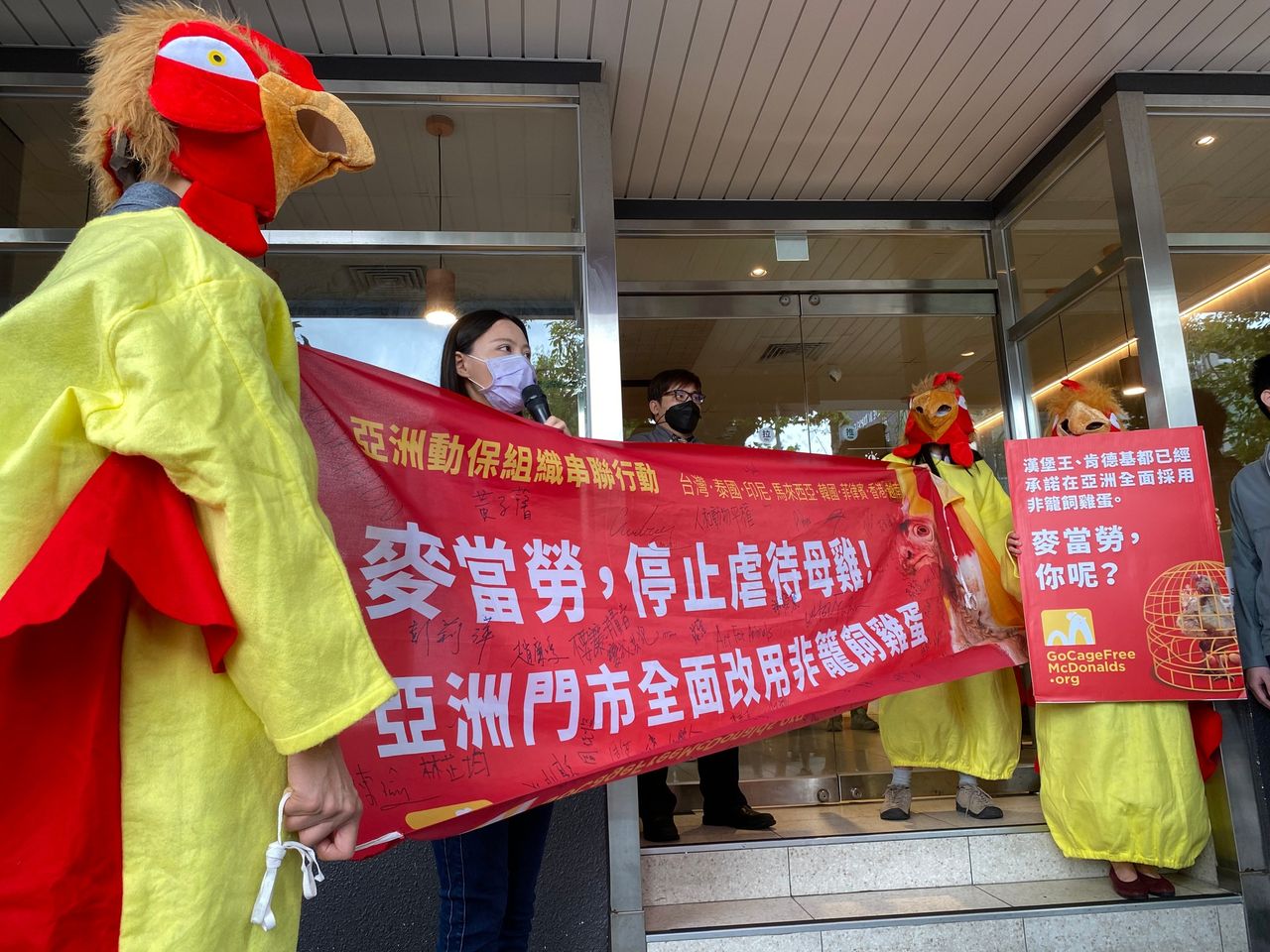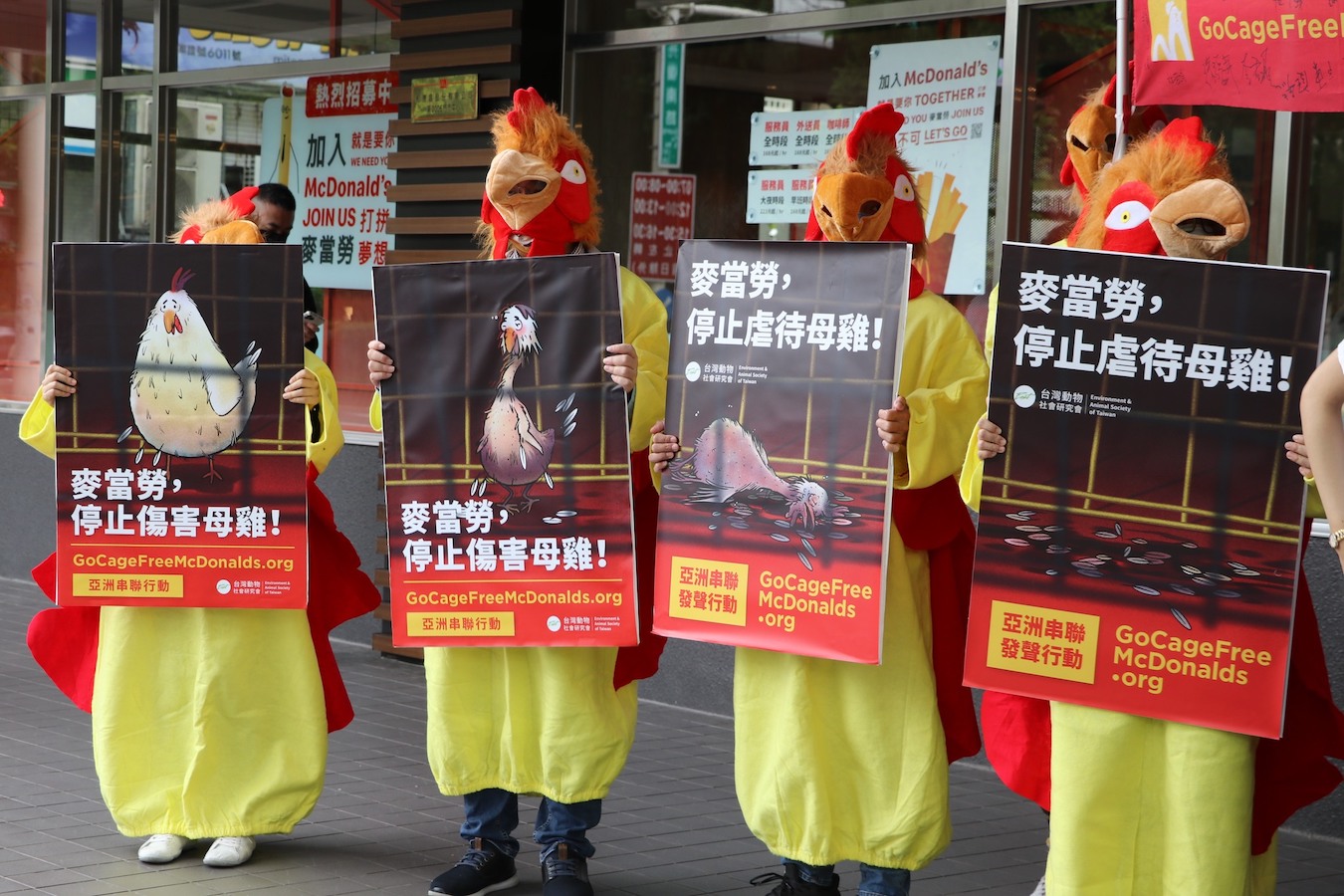by Brian Hioe
語言:
English
Photo Credit: 台灣動物社會研究會/Facebook
THE ENVIRONMENT AND ANIMAL Society of Taiwan (EAST) protested outside of a McDonald’s earlier this month to call on the fast-food chain to transition toward using cage-free eggs, rather than from chickens raised in cages. The demonstration took place last Saturday.
The protest was live streamed. Apart from speakers, a number of EAST members also dressed as chickens, wearing costumes with chicken heads.
The protest was held as an international action, involving coordinated protests in Thailand, the Philippines, South Korea, Indonesia, Vietnam, Malaysia, and Hong Kong. Past protests regarding the issue by EAST were also internationally coordinated, such as a March protest that coincided with events held in eleven cities, which included Bali, Bangkok, Hanoi, Ho Chi Minh City, Hong Kong, Jakarta, Kuala Lumpur, Manila, and Yogyakarta. The protests have been organized internationally by the Open Wing Alliance.
 Photo credit: 台灣動物社會研究會/Facebook
Photo credit: 台灣動物社會研究會/Facebook
In particular, EAST called on McDonald’s to phase out the use of eggs from battery-farmed chickens, the term referring to chickens raised in battery cages. The use of battery cages is criticized because chickens are packed together and unable to move in battery cages, and not able to spread their wings, or engage in other natural behaviors. According to EAST, two to five chickens are stuffed in cages not much larger than a sheet of paper in farms that use battery cages.
Other major fast-food chains in Asia, such as Burger King and KFC, have promised to phase out the use of eggs from chickens raised in cages by 2030. The hypermarket chain Carrefour has also promised to do the same, working in collaboration with EAST. Carrefour has set out a timeline to transition to 100% cage-free eggs for its private-label eggs by 2025, starting from cage-free egg areas set up in stores in 2018.
One notes that McDonald’s has promised to transition to cage-free chicken in markets such as Canada, Latin America, the US, and South Africa. However, this is not the case with its Asia market. McDonald’s claims to shareholders that it intends to use its influence to benefit animal welfare otherwise. Nevertheless, animal rights groups have been campaigning McDonald’s for over ten years, and have not had success to date. One expects that McDonald’s may justify maintaining current conditions for chickens, given supply chain issues that McDonald’s has been experiencing as of late, such as with regards to fries.
To this extent, some of these chains have not lived up to promises to transition to cage-free eggs. As such, EAST also demonstrated outside of a Burger King in November 2020, also calling on Burger King to transition away from caged eggs, and to live up to the claims of its management. The November protest was similar to the protest earlier this week, involving a protest outside a Burger King location, and also involving members of EAST that dressed up in chicken costumes.
 Photo credit: 台灣動物社會研究會/Facebook
Photo credit: 台灣動物社會研究會/Facebook
Issues regarding caged animals also exist for other livestock, and so it is to be seen whether pressure can be placed on fast food chains to transition away from the use of caged livestock. At the same time, it is also a question as to whether advocacy for animals will meet with broader resonance on the part of the public.
Advocacy for animals in Taiwan disproportionately focuses on pets, such as cats and dogs, and the public has sometimes scoffed at animal rights groups, as it is seen as a waste of time concerning one’s self with the welfare of livestock, when they are to be eaten. Nevertheless, one notes that EAST and such animal welfare groups are not advocating anything beyond improving the situation for animals—they are not advocating veganism or vegetarianism in such advocacy.
It is to be seen if EAST will be successful in garnering enough pressure from the public so as to push McDonald’s and other chains away from the use of battery-farmed chickens. One notes that politicians would be unlikely to take action on the issue if it were not one that affected their votes, and so it proves difficult to appeal to legislators or other politicians regarding the issue of battery-farmed chickens. Consumer activism in Taiwan, then, may be the way to pressure chains such as McDonald’s, which is probably what EAST and other animal rights groups are aiming at.

